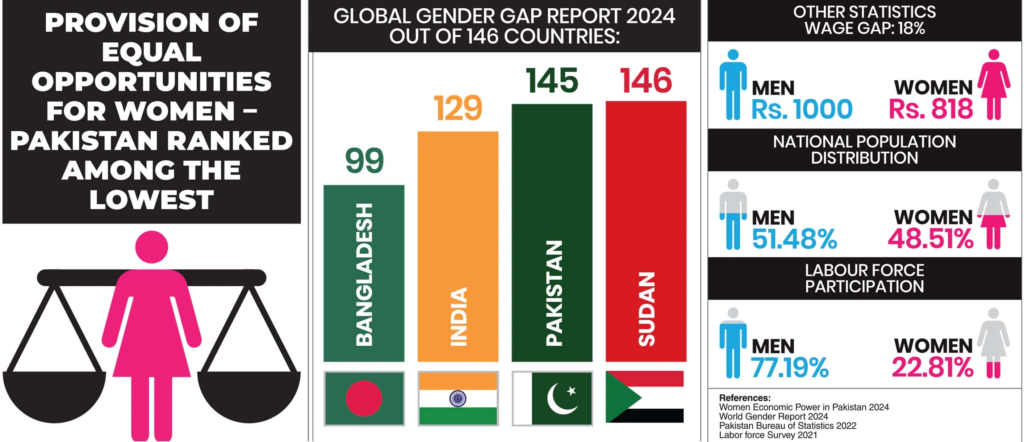
Pakistan stands at 145th out of 146 countries in the World Economic Forum’s Global Gender Equality Report 2024. Only 36% of Pakistani women participate in economic activities, with a mere 23% in the workforce. In agriculture, 76% of employed women work without pay. Additionally, the country’s literacy rate is 67%, highlighting significant gender disparities.
Pakistan has been ranked 145th out of 146 countries in the World Economic Forum’s (WEF) Global Gender Gap Report 2024, placing it just above Sudan. In comparison, neighboring countries like Bangladesh and India are ranked in global gender equality at 99th and 129th, respectively.
The report highlights significant disparities in Pakistan, particularly in economic participation and opportunity for women. Only 36% of women are engaged in economic activities. Whereas a mere 23% are part of the workforce, leaving over 40 million women outside the labor force. This contributes to a substantial gender wage gap, with women earning 18% less than men. It means that for every Rs1,000 earned by a man, a woman earns only Rs818 for the same work.

The agricultural sector, employing 68% of working women, presents a stark contrast. 76% of these women work without pay, compared to 24% of men in the same sector. Leadership roles also show a significant gender imbalance, with only 0.14% of managerial positions held by women, whereas men occupy 2.33% of these roles.
Educational attainment in Pakistan further reflects gender disparities. The country’s literacy rate stands at 67%, notably lower than Nepal’s 78%. There are also considerable gaps in enrollment across various education levels. It actively contributes to South Asia’s position as the region with the second-lowest educational attainment score globally.
The WEF report emphasizes the need for substantial improvements in economic gender parity to ensure women have unrestricted access to resources, opportunities, and decision-making positions. It calls on governments to enhance frameworks that enable businesses and civil society to collaborate effectively, recognizing gender equality as an economic imperative that meets basic needs and fosters innovation.
Addressing these challenges is crucial for Pakistan’s progress toward gender equality, requiring concerted efforts from all sectors of society to create a more inclusive and equitable environment for women.

